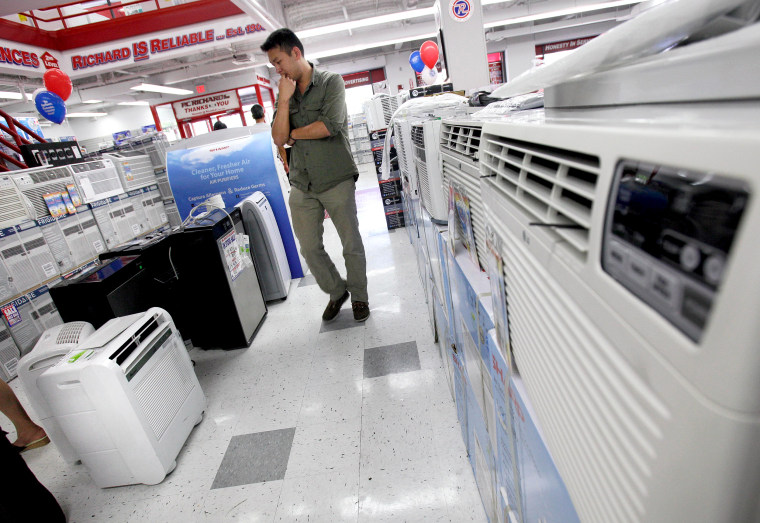The Western U.S. is sizzling this July Fourth weekend, including spots in the normally cool Northwest where many homes have no air conditioners. Wherever you live, and whether a heat wave is a novelty or just what you call those months between April and October, here are 11 tips for cooling your home without breaking the bank.
Make sure you have the right air conditioner
Don’t buy more air conditioner than you need. If you’re only looking to cool one room, a window unit is the best buy.
Cooling power is measured in British thermal units, or Btus. You can cool a 400-square-foot room with a 9,000 Btu air conditioner, though you might need a more powerful machine if you’re using it in the kitchen or in a very sunny space. Click here for a quick guide to picking the right size.
If your home already has a system of ducts installed, central air may save money.
Check the energy star rating
Energy efficient appliances are marked with an “Energy Star” sticker. On average, Energy Star air conditioners are 15 percent more efficient than other units. If you’re replacing a 10-year-old unit with an Energy Star model, you can expect the new unit to be 30 percent more efficient. Some smaller units can now cool a room for just $70 a year.
Turn up the thermostat
You can go cooler when you need to, but keeping your thermostat at 78 degrees will save energy while maintaining comfort. Every degree above 78 saves about 2 percent on your bill, while every degree below costs an extra 6 percent.
Use fans to help the AC
Fans are cheaper to run than air conditioners, and can be used in place of air conditioners or along with them to save money.
If you have a ceiling fan, run it at the same time as the AC. It pushes cooler air down and over the bodies of the people in the room. You can actually raise the thermostat on your air conditioning unit by 4 degrees without lessening the cooling effect if you turn on the ceiling fan.
Check which way the fan’s blades are turning
Make sure the ceiling fan’s blades are turning counter-clockwise and pushing the air down, not up. If the fan is pulling the air up, it defeats the purpose of running it.

Don’t run fans when you’re not around
If you’re running a floor or ceiling fan in a closed room, just remember not to leave the fan running when you’re not there. Fans themselves don’t actually cool a room. They just cool the bodies inside the room by moving the air. And don’t use the air conditioner’s fan setting in a window unit if it’s hotter outside your house than inside. You’re just pulling hot air into your house.
Use a programmable thermostat
Take advantage of the timing features on a programmable thermostat to let your house heat up when you’re not there and when you sleep. You don’t want to spend money on air conditioning when it’s not doing anything for you.
Don’t let the sun in
This doesn’t mean no natural light can enter your house. Installing window coverings that let in light but keep out heat is a win-win that will help you save on cooling costs.
Turn off the lights
Incandescent bulbs create more heat than light. Use compact fluorescent bulbs if you can, but whatever bulbs you use, remember to turn them off.
Maintain your unit
Regular maintenance is crucial. Replacing and cleaning filters can reduce energy consumption by 5 to 15 percent. The Energy Department also recommends checking and cleaning the evaporator coil yearly, straightening bent coil fins with a “fin comb,” cleaning debris and leaves from the fan, compressor, and condenser, and snaking out drain channels to prevent clogging. If you have central air, make sure none of your registers are blocked.
Cook outside on hot days
Any internal heat like an oven or stovetop will put a strain on your air conditioner, making it much less efficient. If you must cook inside, consider using your slow-cooker, and use the range hood fan to suck the hot air out of the kitchen. Grilling in the backyard will save energy. Chances are that was part of your July Fourth plans anyway.